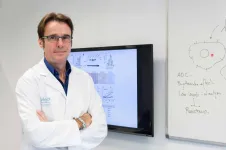Kentucky is home to the highest rates of cancer incidence and mortality in the country, and that problem is further concentrated in the Appalachian region of the state. Funded by a grant from the National Cancer Institute, ACTION is a two-year program designed to prepare undergraduate and high school students for cancer-focused careers and is open to students who hail from one of the 54 Appalachian Kentucky counties. The program also educates students on ways to make a difference in their own communities through outreach and engagement.
Perhaps not surprisingly, nearly all of ACTION's participants know a friend or family member dealing with cancer.
"It became pretty clear early on that the students were all personally touched by cancer, which was one of the reasons why they were in the program, but they didn't really know much about cancer," said Nathan Vanderford, director of the ACTION Program. "So that got us talking more to them and to their teachers about what's currently being taught in schools regarding the disease."
The ACTION team conducted an online survey with science and health teachers in Appalachian Kentucky. Published in the Journal of Appalachian Health, results of the survey showed that participating teachers agreed that cancer education was important to their students' lives, but the amount of such education is inconsistent.
The participating teachers also expressed a desire to increase cancer education in their classrooms. Many teacher responses touched on the fact that both they and their students see the devastating impact of cancer in their daily lives. Several responses noted the importance of teaching students about cancer from more of a public health angle, i.e., learning more about prevention and risk factors for cancer.
"There's a huge opportunity here, and I think there's a thirst for the knowledge," Vanderford said. "In the survey, without any prompting, the teachers told us exactly what we know - that they and their students are bombarded by cancer all around them, and I think that makes them naturally more curious about the topic."
In response, Vanderford decided to create a curriculum for teachers, reaching out to UK College of Education faculty for expertise on taking the cancer information he wanted teachers to have and developing it into lessons that would fit teachers' current curriculum requirements.
"We know the teachers want to teach about cancer, but it isn't laid out in the curriculum or in the standards," said Sahar Alameh, an assistant professor of STEM education in the UK College of Education. "For example, they told us that they mention cancer when they talk about the ozone layer, or when they talk about mutation and mitosis, but it's not a lesson. My goal was to take Nathan's lessons and suggest modifications to them so they aligned with teaching standards."
"I thought it was really important to work with faculty in the College of Education, because they prepare future teachers every day and they are experts in science education pedagogy," Vanderford said. "Teachers have to teach to these academic standards anyway, but if we can take this great information about a public health topic that is of utmost importance to your students and community and you can be touching on those standards, it's a win-win."
This collaboration yielded a new three-part cancer education curriculum for middle and high school teachers in Appalachia to use in their classrooms. The curriculum includes information on cancer data and risk factors in the region, follows national and state science and health education standards, and is tailored to cultural aspects of Appalachian Kentucky.
Including that Kentucky-specific information was key, Vanderford says. He wanted the cancer lessons to reflect the reality of what teachers and students experience daily, and that also included topics like fatalistic views on cancer and issues around health care access and engagement.
"People tell me all the time that they have had friends and family with cancer and they see it everywhere, but they didn't know, for example, that our cancer rates are the highest in the country," Vanderford said. "The more relevant a topic is to a person, the more they're going to pay attention to it."
With that in mind, Alameh says the curriculum is an example of problem-based learning, a teaching method where real-world issues are used to help drive the learning process in students.
"The teachers tell you that whenever they talk about cancer, the kids - even elementary and middle school kids, not just the high school kids - want to share a story about someone they know who had cancer," she said. "When you situate learning in a meaningful situation, it definitely produces more engagement."
Vanderford and Alameh both highlight the project as a unique, fruitful collaboration between different colleges. Other contributors to the project include ACTION program coordinator Chris Prichard, UK College of Education Associate Professor Melinda Ickes and graduate student Katherine Sharp, and UK College of Arts and Sciences undergraduate student Lauren Hudson.
Hudson, a junior majoring in neuroscience, works with the ACTION Program and is first author on the study. Like the students in the program, the northern Kentucky native had firsthand experience of dealing with cancer, as her mother is a 17-year breast cancer survivor. She says she was always interested in oncology, but was unaware of the scope of the cancer problem in Kentucky until she became involved with ACTION.
"When I started working on this and learning more about it, I thought, 'Why aren't we talking about this more in the areas of Kentucky where everyone needs to know about cancer?'" she said. "This is really exciting for me. In high school, if someone had presented this material to me, I would have loved it. I know there are students out there like me who were interested in medicine, but health disparities are not always covered in high school. I like to think there are students who are going to realize that pursuing a cancer career is what they want to do from learning this curriculum."
The team has already begun disseminating the curriculum to teachers in the region and will continue to adapt the curriculum based on feedback from both teachers and students. Seeing their work making its way into Kentucky communities is exciting, says Vanderford, who notes that creating a tangible, useful product from scientific work is a rare and difficult process. With more than 40 publications under his belt, this project is especially significant for him.
"It's a scientist's dream to actually create something that people will use and that will be helpful for people's knowledge and in this case, potentially impact public health in terms of lowering cancer risk," Vanderford. "For this reason, our work here is kind of phenomenal to me."
INFORMATION:
Research reported in this publication was supported by the National Cancer Institute of the National Institutes of Health under Award Number R25CA221765. The content is solely the responsibility of the authors and does not necessarily represent the official views of the National Institutes of Health.


